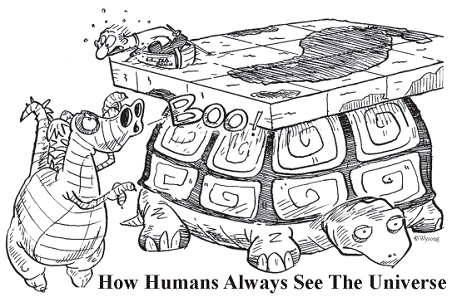Place email address below
for Dr. Wysong's free "Thinking Matters" newsletter/blog
Is there any evidence in our everyday lives of such things as an out of body experience, something we can personally experience or observe, to suggest that there is any real empirical truth to this confusing reality? Yes, there is.
Over the course of the following chapters you will be exposed to evidence and ideas, like the out of body experience that will test your ability to keep an open mind. If you are materialistic, atheistic, religious, evolutionary, humanistic, or of some other conviction you will struggle to reconcile the following catalog of outrageously strange and unbelievable facts. Resist the irresistible desire to reject contradictions to prior beliefs. Just let the information in - no matter how weird it may seem - to permit a fresh new look at our place in the universe. As Thomas Jefferson once said, "Only those who can see the invisible, can do the impossible."
The Edge-Of-The-Map Syndrome
Unfortunately, every generation wants to believe they are on the brink of discovering, or have discovered, all there is to know. Ancient cartographers wrote on the blurred edges of their maps, "there be dragons." This edge-of-the-map syndrome is typified today by those who naively claim there is only a void beyond present knowledge. To keep this mindset they must exclude all data that falls outside accepted dogma. They reason that if all that can be known is known, then anything that contradicts this tidy package, such as an out of body experience, must be fraudulent or false.

We must continuously remind ourselves that the void beyond our present maps is never empty; it is always just a new wilderness to discover. St. Augustine said, "Miracles happen, not in opposition to nature, but in opposition to what we know of nature."
Einstein agreed, "There are only two ways to live your life; one is as though nothing is a miracle, the other is as though everything is. I believe in the latter." On the other hand, an open mind is a wonderful thing but only so long as we don't let our brains fall out. Keeping a damper on things using logic, reason, and evidence (the SOLVER principles) is the safeguard.
Unfortunately, humans tend to think in terms of consensus, as if plebiscite makes things so. Conformity to what the majority thinks seems safe. But truth is not a thing molded by our votes. It is just they're oblivious to our self-serving and emotional agendas and only potentially accessible by an open examination of all the evidence.
Anecdote, Observation, Experience
Before beginning this summary of quite unbelievable evidence, let me get one thing straight about believability. The most common reason for dismissal of evidence outside the norm is the charge that some such evidence is anecdotal. An anecdote, such as a person having an out of body experience, is viewed as just an opinion, experience, or story without having been subject to the cleansing effects of scientific controls. Setting aside that much of what is presented in these chapters is a product of proper and careful scientific investigation (refer to Resources and References sections in the back of the book), consider that anecdotes in the form of observation, personal experience, and testimony form the very basis of our legal system and of science itself.
Observation is the starting point of science. Without it there could be no science. Newton formulated a science about gravity by first observing an apple falling from a tree. Darwin developed his evolutionary theories by observing variations in nature. In medicine there is a clinical study called "N of 1" where observation of a single patient is used to create useful medical information and a practical theory.
Seeing, doing, and experiencing all go a long way toward convincing. Anybody can construct some lame skeptical physical explanation for any event, like an out of body experience for example, if they believe (with religious-like faith) that the limit of reality is only what they have read in accepted scientific textbooks about physical reality.
